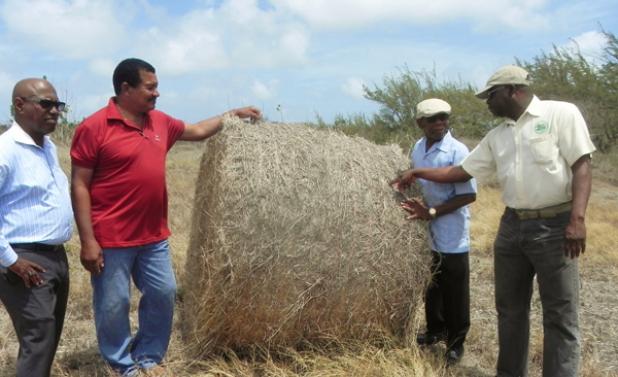
Farmers not happy about HOPE project
Fri, 04/01/2016 - 12:00am
By:
Regina Selman Moore
“Let us sit down and look at this project!”
This is the appeal CEO of the Barbados Agricultural Society (BAS), James Paul, is making to officials at the Ministry of Education and principals at the Samuel Jackman
Prescod Polytechnic (SJPP) and the Barbados Community College, concerning what is being referred to as the Hope Project.
Paul has made it clear that there needs to be some consultation with BAS officials and dairy and sheep farmers in the north of the island, so that concerns about the removal of 45 acres of quality grassland at Hope Plantation in St. Lucy, in order to establish the HOPE Agriculture Training Institute at that location, can be fully ventilated and addressed.
Government has approved 45 acres of land at Hope, St. Lucy and it is expected that the Barbados Community College (BCC) and the SJPP will share the facility for their Associated Degree and Diploma and Certificate agricultural programmes respectively, to engage students in more practical
agricultural training.
However, Paul says some farmers who depend on the grasslands in that area to supply hay for their livestock year round are worried that too much quality grassland is being taken up, and this will likely have an impact on dairy farms in the area and the local agricultural sector as a whole.
Yesterday, officials from the BAS, namely James Paul; first Vice President Woodville Alleyne-Jones; and second Vice President Peter Chase met up with long-standing northern dairy farmer McDonald Stevenson at the Hope Plantation for a press conference, where they aired their concerns.
Paul stressed that whilst he is not against initiatives that involve getting young people into agriculture, his concern is that the plans for the Hope project will take over the grasslands
relied on by farmers to feed their livestock and this will ultimately compromise the revenue generating activities of farmers, who are already making a valuable contribution to the agricultural sector.
“I welcome any attempt to help the agricultural sector, but it cannot be done in isolation” Paul stressed.
“We can achieve the same objectives that I understand were stated a week ago by the Vice Principal of the SJPP (Ian Drakes). We can do it differently and achieve the same objectives” he maintained.
Stressing that he was not satisfied with the level of communication between the two ministries involved, he added, “I am just making an appeal to the Ministry of Education and the Principals (involved), let us sit down and look at this project and see whether or not what is being constructed, is actually what the agricultural sector needs”. (RSM)
